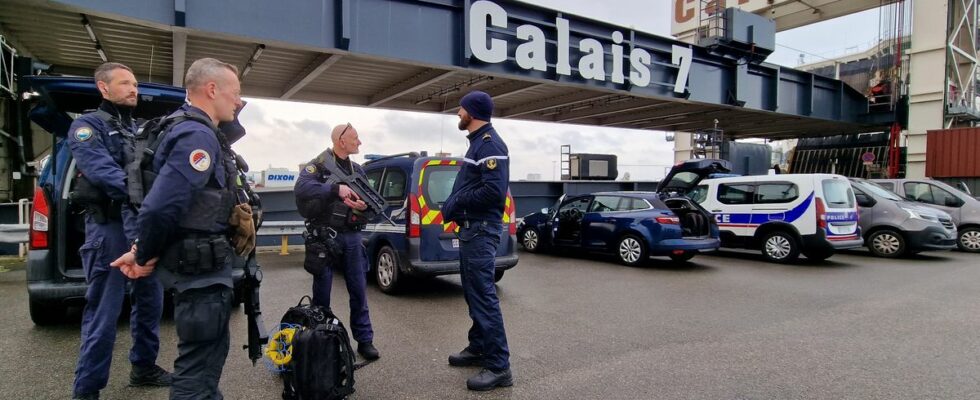“The sea is a really special area,” says Captain Julien, the maritime policeman who commands the maritime and port security platoon (PSMP) in Calais. It was with some of his men, and others belonging to the PSMP in Dunkirk, that 20 minutes boarded the Opal Coastone of three DFDS ferries flying the French flag to operate between Calais and Dover in Great Britain.
PSMPs, there are nine in France, distributed in the most important ports, civil or military. The installation of such a unit in Calais takes on its full meaning in view of the “strong migratory pressure” exerted by numerous illegal immigrants attracted by the British El Dorado. But this is not the only reason, the other main one being the number of passengers who pass through this port each year, five million in 2022. In the aftermath of the attacks that bruised France in 2015, the government approved the creation of passenger ship protection teams (Epnap) to deal with possible terrorist threats on board ferries. “If the terrorist threat is still present and diffuse, we are reorienting ourselves today rather on the threat that a madman on board would represent”, explains Lieutenant Julien, boss of the PSMP of Dunkirk.
“Alone on board, we will be the first responders”
The job of these Epnaps therefore consists of patrolling on board passenger ships flying the French flag and providing links between France and Great Britain. “Protection, securing, dissuasion” are the watchwords given at the morning briefing by the leader of the group that 20 minutes followed on Thursday. The team is made up of five men, all seasoned sailors. “Alone on board, we will be the first responders if anything happens. This is why we are equipped with heavy equipment,” explains one of the team members. Vest that can stop projectiles from weapons of war, assault rifle, handgun, helmet and specific equipment in the event of discovery of an explosive device.
Between monitoring boarding and disembarkation operations, patrolling public bridges during crossings, the military is everywhere. “It reassures passengers and crew members to have gendarmes on board”, recognizes a member of the DFDS company. The idea is above all to deter possible malicious behavior. “We don’t do it on all the crossings, it’s not useful. It is a question of doing it randomly, by screening the passengers or according to particular events, such as the movements of football supporters for example, ”specifies Lieutenant Julien. Most of the time it is quite calm and incidents are rare. “We have a little too often thefts in duty free shops, sometimes alcoholic people but it stops there”, says, from experience, Jacques Le Fur, purser on the Opal Coast.
Migrant crossings and intelligence
The Epnap, a rather relaxing mission for the maritime gendarmes if we put aside the kilos of equipment they carry all day. Because there are many others much less peaceful, especially those around the migration issue. A few days earlier, in the middle of Valentine’s Day, one of the team’s soldiers was in operation on a migrant crossing. “They were about forty in a semi-rigid, the men on the sausages, one leg in the water, the children and the women in the middle. They refused our help until their engine broke down,” he recalls. “Sometimes, when they see the police, they throw one of the passengers overboard to have time to escape while we take care of the castaway,” he adds.
These gendarmes are also a valuable source of information for the French Navy. “During control operations on board commercial ships, we collect a lot of information. Their route, where they come from, the ships they meet,” explains Captain Jean. It is in particular in this way, last January, that the authorities were notified upstream than a Russian warship, armed with missiles, was going to pass very quietly through the Strait of Pas-de-Calais. “It’s the game, everyone spies on everyone,” jokes Lieutenant Julien all the same. During Thursday’s crossing, nothing happened. Neither “small boat”, nor military building, nor flight, nor turbulent passenger, “and it is very well thus”, recognize the maritime gendarmes.

